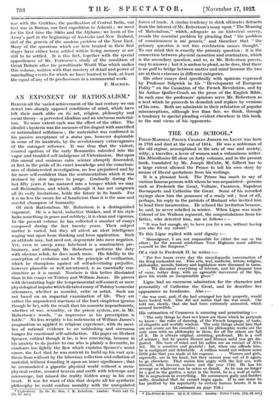THE BRITISH ARMY AFTER THE NAPOLEONIC WARS:*'
Mn. ForerEseuE's eleventh volume falls roughly into two parts. The first part deals with the political, social and economic life of our. country. after the Napoleonic Wars, the second with the establishment of British rule in Central India, and with the beginnings of that long series of small wars which lasted almost continuously throughout the nineteenth century. In the first part Mr. Fortescue. is, of. course, concerned with the reaction of 'conditions and events upon the Army, but he insists in this volume, as he has in previous volumes, that the Army is composed- of men taken from the body of citizens, and that its habits and circumstances reflect very faithfully those of the times. This makes the latest addition to the History of the British Army of peculiar interest, not only to those who have a taste for military history but to the general reader, who is troubled and pen plexed, by the problems of' to-day. In the period' covered, 1815-1838, we find Great Britain straggling with- the after-
math of a great war ; we find the completion of peace arousing extravagant expectations ; we find an artificial boom followed' by acute depression of 'trade, unemployment and widespread distress-; we find' relief of the burden of taxation and the reduction of armaments in the forefront of political programmes —in short, we find that the sequel of one great war is very much that of another. Those who deny the reality of progress will find it difficult, if they read this book, to maintain that
there are' not some matters in which we have advanced in the past hundred years, that there are not some -of the prob-
lems of reconstruction after war which we are tackling more - wisely and more generously than our forebears. The treat- ment of 'the soldier is one 'of them. The changes in the condi- tions of life in the Army between the period which followed Waterloo and to-day are remarkable, and they connote corre- sponding changes in the moral and social standards of the country at large. Then drunkenness was the prevalent vice in the Army ; it was also the prevalent vice of Society. in the Army it was then encouraged by the State in order to rake into the Treasury a • few thousands from the profits of the soldiers' canteens. Flogging was the common punish- ment in the Army, but it was common also in civil gaols. Of the conditions of life in barracks letlfr: Forteseue speak :—
" The men were huddled together by fours in wooden cribs, actually by fours' though even during the Wars of the Roses it had been considered unseemly to pack soldiers of a superior stamp more closely than two in a bed. The sanitary arrangements were unspeakable and contributed very considerably to poison the atmosphere of the barrack room. . . . Nor were disorders wanting, owing to other causes. In the first place, the barrack rooms were • shared by the wives of soldiers married 'on the strength,' the proportion of wives allowed in barracks being six to every hundred men. It was to these rooms that the soldier brought his newly- wedded partner for the honeymoon, and it was in these his children were born, all in the presence of half-a-dozen comrades."
That the sanitary arrangements were " unspeakable " (the urine tubs were the only washing vessels supplied to the soldier) is not surprising, if we remember that as late as 1850, when the cholera came, whole districts were found to be drinking sewage. The Duke of Wellington provided single iron bedsteads for the soldiers in 1827, but' it was long before decent married quarters were general, for Sir William Robertson tells us that married women were still living in - the barrack rooms when he joined.
With the peace the purchase system, suspended during war, was again in full activity, and the tailor set himself to work to find new places on the officers' tunics for the applica- tion of gold braid. In 1851 it was calculated that after deducting allowances and necessary expenses, and of interest
on the cost of commissions, the net pay of a Lieutenant- Colonel of the Guards amounted to £88 33, per annum and of the Line to £85 5s. We are- told of an officer of cavalry
who, having to escort Queen Victoria in the early days of her reign through a thunderstorm, found the loss to himself in - damage to horse and uniform amount to 1700. Small wonder then that many officers regarded their pay as a retaining fee for their services- in time of war and did as little work as might be in time of peace. The subaltern of to-day with £300 a year may read' and marvel.
The second part of this volume deals with our first and only'
• History of the British Army. Vol. XI. By Hon. 3. W. Forteseuo. London: Macmillan. PlOs.j war with the Gurkhas, the pacification of Central India, our first War in Burma, our first expedition to Ashanti ;. we meet for the first time the Sikhs and the Afghans ; we learn of the Army's part in the beginnings of Australia and New Zealand, and of the genesis of the modern problem of the Near East. Many of the questions which are here treated in their first stages have either been settled within living memory or are still to be settled. It is this fact, together with the special appositeness of Mr. Fortescue's study of the condition of Great Britain after the penultimate World 'War which makes this volume, written with that mastery of detail and power of marshalling events for which we have learned to look, at least the equal of any of its predecessors in a monumental work.
F. MATJRICE.



























































 Previous page
Previous page